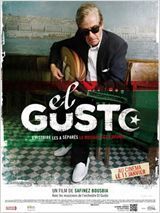The "Country Music" of Algiers: Chaâbi

When I came to live in Paris, a few decades ago, my French was very rudimentary. My first impulse in the evenings was to go to the local cafés and get in some conversation. I found most of the bars either empty or very stand-offish and I gradually found my way to the Berber/Kabyle bars in places like Levallois and Clichy, where the small, sweaty, music-packed spaces heaved with young Algerian workers knocking back bottles of beer, and where the welcome was much warmer. As my French improved, we often had conversations about the similarities between Ireland's war for independence, the civil war that followed it, the troubles in the North of Ireland, the recently ended Algerian war of independence and how "freedom" often meant emigration to the land of the old colonial power. We all agreed that the senior people who had emerged "victorious" from the wars of independence in Ireland and Algeria had then betrayed their people's aspirations.
Since those early days, I have often had the opportunity to work in Algeria, especially in Algiers, where I fell in love not only with the sort of Arab-Andalusian music still sung by Enrico Macias in France (sadly, he doesn't have the right to set foot in Algeria), which he learned in his native Constantine, before he had to leave the city, but also with that form of music native to Algiers as Chaâbi.
When I asked a friend from Algiers, a petroleum engineer who had worked in Texas, to tell me about the origins of Chaâbi, he told me it became popular in the 1920s, thanks to the songs of a great songwriter and musician known as El Anka. The closest equivalent he could think of was American country music, although the sounds are very different. Chaâbi songs yearn for peace and the first ones sprang from the hard grind of the daily round of the diverse peoples who used to live in the streets of Algiers, before Independence. The Jews of the Casbah were forced into exile, one way or another, but the Muslims who still live in the overcrowded apartments in the old Casbah, and the narrow alleyways of other parts of Algiers, still listen to the rythms of Chaâbi from dawn to dusk. It is said that Chaâbi helps people to forget their misery, their hunger and their thirst.
Last Tuesday evening, a Chaâbi group known as El Gusto gave a concert in the Grand Rex cinema in Paris, in what the daily newspaper, Le Monde, described as a form of reconciliation. Fifty years ago, the Algerian war of Independence, was a victory over colonialism, but it also brought about the bitter separation from the mother country of most of Algeria's Jews. This group of veteran Jewish and Muslim musicians, whose members had been educated side by side, in the music academies of pre-independence Algeria, but who hadn't seen each other for fifty years, was brought together in 2007 by Safinez Bousbia, a young Irish Algerian. (It was probably the fact that she is Irish and Algerian that kindled my interest in the story.) Safinez Bousbia has also made a film that tells how she reunited the musicians.
In all, El Gusto is made up of twenty-seven musicians. Le Monde quotes a musician from the film:
"If we scraped the lime off the walls of the Casbah in Algiers, each grain would recite one of El Anka's poems, that's how deep his poetry is incrusted in our blood."
The article ends:
"Hadj Mohamed El-Anka, who lived from 1907 to 1978, was a prolific composer and teacher, and in some cases, a colleague to the musicians who make up El Gusto today. He was the person who put the modern cast on this music, born from the centuries long cohabitation of Jews and Muslims. It's a body of "dancing poetry", invented deep in the alleyways of the Casbah of Algiers. Chaâbi was the music of a dissolute Algeria, where small crooks, dockers and port prostitutes lived side by side with craftsmen and hashish smokers."
It's difficult to explain why one engages in a love affair with a people or its music, but if ever you'd like to have a chat about it there's a certain Algerian café, in the North of Paris, where I can be found most Sunday mornings.








Published on January 12, 2012 04:19
No comments have been added yet.



